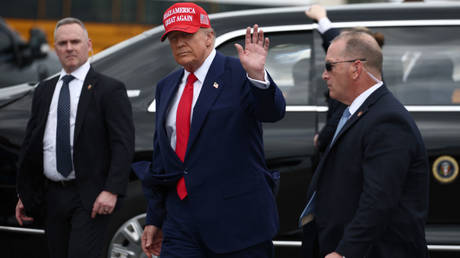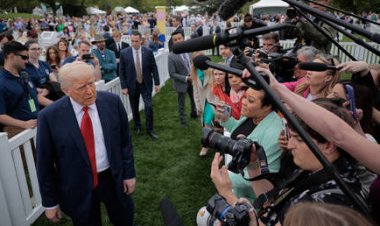Trump warns that Brussels' reaction to US tariffs will harm the EU
The US President claims that the potential prohibition of US food imports by the EU would primarily impact the economy of the bloc.. source:TROIB RTS

US President Donald Trump has cautioned that such a move by Brussels, aimed at halting imports of American soybeans and other food items produced under different standards, would ultimately harm the European Union. Reports indicate that the EU is contemplating countermeasures in response to recent tariffs imposed by Washington.
The trade conflict between the US and the EU has intensified since Trump announced intentions to implement a range of import duties to address what he sees as a trade imbalance. These measures include significant tariffs on steel and aluminum, reciprocal tariffs on a country-by-country basis, and separate tariffs on cars, pharmaceuticals, and semiconductor chips.
According to a Sunday report by the Financial Times, which cited officials, the European Commission is gearing up to unveil the first set of retaliatory tariffs. These tariffs are likely to focus on American crops, particularly soybeans, cultivated with pesticides that are prohibited for use by EU farmers.
The US president dismissed the reported plans, stating that “it’s just hurting themselves if they do that.” Trump emphasized that the White House remains committed to implementing reciprocal tariffs.
“That’s alright, I don’t mind; Let them do it, let them do it,” he remarked on Sunday while addressing journalists in Daytona Beach, Florida, during the Daytona 500 car race.
The US and the EU have been engaged in a significant trade dispute since 2018, when Trump enacted tariffs of 25% on European steel imports and 10% on aluminum, citing national security concerns linked to European competition.
In retaliation, the EU imposed its own countermeasures, introducing import duties on products such as Harley-Davidson motorcycles and Levi Strauss & Co jeans. Tensions increased further when Trump threatened to levy tariffs on European car exports, though those measures were never carried out.
As part of his ongoing tariff policies, Trump has instituted a 25% duty on all steel and aluminum imports into the US as of March 4, stressing that these tariffs would be in addition to existing levies on metals.
Last week, Trump allegedly directed Howard Lutnick, his nominee for US trade representative and commerce secretary, to suggest new tariffs on a country-by-country basis with the aim of rebalancing trade relations by April 1.
Since his inauguration on January 20, he has also placed a 25% tariff on all imports from Mexico and Canada, along with an additional 10% tariff on goods from China, citing issues related to illegal immigration and drug trafficking. Following talks with leaders from Mexico and Canada, these tariffs were delayed for 30 days as both countries agreed to improve border security.
Trump also paused a crucial tariff provision by preserving the duty-free status of small-value packages from China after the measure led to delivery disruptions the previous week.
Sanya Singh for TROIB News
Find more stories on Business, Economy and Finance in TROIB business












